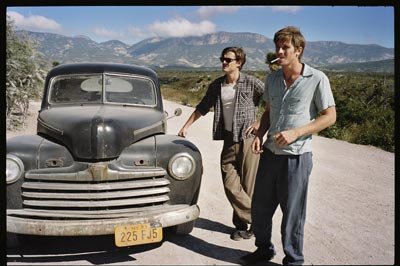It took more than 50 years for Jack Kerouac’s bestseller “On the Road” to be turned into a film. And curiously, this American classic about freedom — be it of the sexual, spiritual, musical or drink- or drug-induced kind — is directed by Walter Salles, a Brazilian. Working from an adaptation by Jose Rivera (whom Salles partnered with on “The Motorcycle Diaries”), the film, opening March 22 at Ritz East, is faithful to key chunks of Kerouac’s vivid prose. While no screen version can do complete justice to Kerouac’s novel, this cinematic take mostly succeeds.
Salles’ film gets the beat era’s language, as well as the jazzy camaraderie of its young men and women, right. These are lives fueled by cigarettes, Benzedrine and joints, alcohol and sex, poetry and the open road, poetry of the open road and the freedom that comes from being one’s own person.
The film, shot by Eric Gautier, looks utterly gorgeous. Many of the urban scenes have the burnished lighting and composition of a poignant Edward Hopper painting. Scenes on the wide, open road are absolutely luminous. The atmosphere of a seedy apartment, diner or bar are all richly textured.
The story opens with Sal Paradise (Sam Riley of “Control” plays the Kerouac character) recounting his first meeting with Dean Moriarity (Garrett Hedlund in the Neal Cassady role) when the latter arrives in New York. The two men become fast friends — like long-lost brothers, they say — and Dean prompts Sal to begin his life “on the road.”
These early scenes have an urgency and energy that mirrors Kerouac’s jaunty text. The way the characters relate to one another also captures the spirit of the times and of the book. When Carlo (Tom Sturridge, who represents Alan Ginsberg) kisses Dean, or has a threesome with Dean and a girl, Carlo effuses about the encounter, declaring, “This is how you love.” It is very of-the -moment and very typical of the intellectualizing that these characters did in the late 1940s.
“On the Road” meanders a bit after its initial kinetic burst. A sequence of Sal picking cotton in Selma, Calif., is important — it shows him working, and away from Dean’s influence — but it slows things down before they pick back up with the two friends reuniting.
Sal’s meetings with Dean often involve the latter’s romantic entanglements. Dean loves two women: Marylou (Kristen Stewart) and Camille (Kirsten Dunst as the Carolyn Cassady figure). He frequently spends time with one or the other or travels back and forth between them. In contrast, Sal is more passive. Even when Dean and Marylou invite him into their bed, Sal’s discomfort prompts him to ask Dean to leave the room. But Sal is not always so prudish, as a scene of Marylou servicing the guys in the front seat of a car proves.
The film version of “On the Road” makes Dean a mythical figure — not unlike Kerouac’s portrayal in his book. Hedlund’s Dean is a magnetic conman throughout the film. His enthusiasm is pretty infectious and the sexy actor does well in the difficult role; he certainly makes viewers appreciate his hedonism. Watching this good-looking young man swagger shirtless or naked around a room is enticing. Other scenes, of Dean stealing gas or food, are also appealing, as is watching him trying to sweet- talk his way out of a speeding ticket after getting pulled over for zooming down the highway.
In contrast, Sal is far less interesting a character for much of the drama. He is often the quiet observer, taking careful, copious notes, which he will use to turn his and Dean’s story into the celebrated novel. Sal’s few active moments are as a substitute for Dean. He is Camille’s dance partner in one scene, and a companion for Marylou in another. Riley does his best with the limited role, but not until his final moments is there a payoff for his slow-burn performance.
“On the Road” is mostly about the two men and their adventures. It is not about the destination, but the journey, and the film makes that clear. An experience the guys have in Mexico may be the most memorable — in part because of the stylish way Salles films it — but there are interesting facets to all their encounters. A meeting with Old Bull Lee (Viggo Mortensen in the William S. Burroughs role) in Louisiana is strange, as are the experiences that result from accepting a ride from a mild-mannered gay man (Steve Buscemi), who gets Dean to fuck him.
All that said, while Dean and Sal’s “visits” have an undeniable chemistry, there is curiously little emotional investment in most of the characters. Dean’s struggle to satisfy both Marylou and Camille is not particularly compelling, nor are episodes featuring Galatea (Elisabeth Moss), who is angry that her husband Ed (Danny Morgan) leaves her while he goes out on the road with the guys. The film’s lack of engagement is its biggest drawback; it may prove why the novel is so tough to film.
Salles’ film may not be a masterpiece — honestly, how could it be, given the book’s legacy? — but it is an earnest effort. This screen version of “On the Road” may enrage purists, and disappoint fans of the novel, but it is a worthwhile attempt at capturing the restless spirit of Kerouac’s classic.
